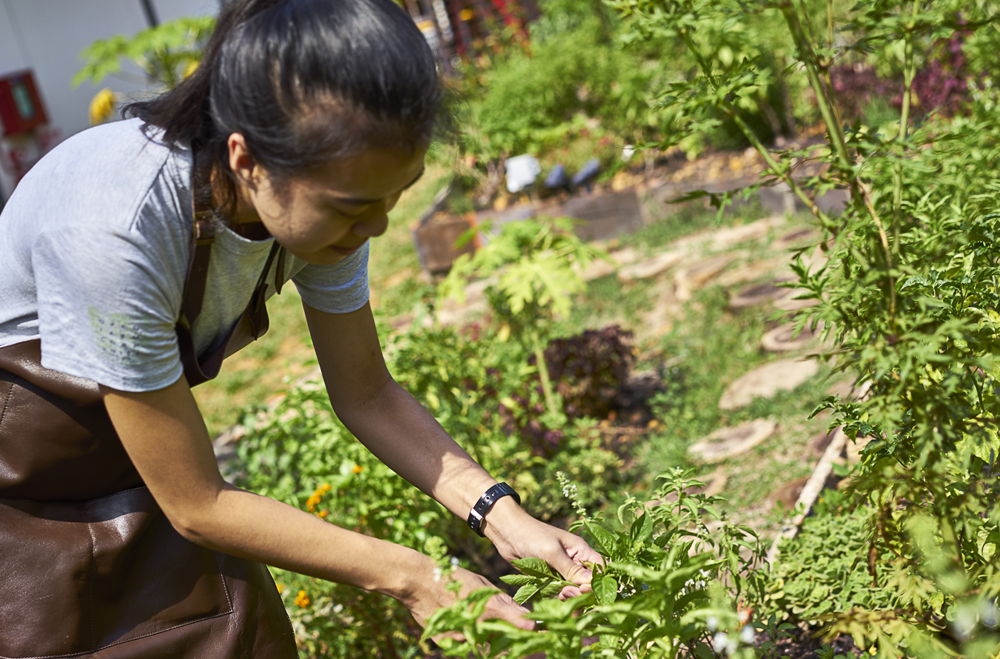There’s no reason not to start growing some of your food at home, given the rise in popularity and accessibility of urban farming these days. You no longer need lots of empty farmland, just space for some plant pots will do. Other than providing ingredients that you need for your cooking, an urban farm at home also allows your minis to appreciate where their food comes from and learn more about nature. Bjorn Low, founder of Edible Garden City shares some tips how you can get started with your very own urban farm.
Mummyfique: What type of space do you need at home for urban farming?
Urban farming has no space limitations, and you can just set aside some space for just one pot of basil on your kitchen windowsill, or a few planter beds along your corridor, balcony or backyard. The key is that the space needs to be exposed to a couple of hours of sunshine for most plants to thrive. Admittedly, that’s the biggest challenge faced by most apartment dwellers face – finding a space that will let their plants get enough sun. However, there is a solution to that: setting up a simple indoor growing operation with lights – this too can produce healthy plants. For this, all you need is a shelf, wall space, some lights and you are good to go.
What are some of the essential equipment you require to do urban farming? Essential pieces of equipment include containers, pots, planters, a watering can and a small shovel. You’ll also need soil, compost, fertilisers and seeds. If you are looking for one place to get “grow-your-own” gardening supplies, you can check out NÓNG.
What are some plants you would recommend beginners start with?
If you have access to plenty of sunlight, you can try Thai Basil, Mint, Ladies’ fingers and Long beans. If direct sunlight is a challenge, you can consider Indian Borage, Pandan, Ginger and Turmeric. All of these do well in our climate, and can be easily grown in small pots. We grow plenty of these plants at our outdoor garden in Open Farm Community, which we use in the dishes and drinks that we serve. If you want something with a quick turnaround, try microgreens. They take around two weeks from seeding to harvest, and do well with partial sunlight from the windowsill.
What are five dos and five don’ts when it comes to urban farming?
Dos:
1. Have a passion and sustained interest in urban farming. If you grow bored after the initial few weeks, you may start forgetting to water, or end up neglecting your plants, which will lead to them eventually dying.
2. Observe, observe, observe. Growing is all about observation. Look at the leaves, feel the soil, check for pests.
3. Go online to look for solutions if you face any problems. The Internet has so many amazing resources and tips for gardening contributed by likeminded people in the community.
4. Find a great soil mix. Good soil is the basis to ensure good health of your plants.
5. Join a community to learn more and share your passion. Whether it’s a local gardening club, or even one that’s Instagram-based, it’s always nice to be part of a community of likeminded urban farmers.
Don’ts:
1. Don’t overwater. Having too much water is one reason why a lot of plants end up dying, when you don’t check if the soil is already wet and drown the plant in the process. Always use a finger to check if the soil is moist. Remember to have drainage holes in the pot so any excess of water can be easily drained.
2. Don’t overcrowd your pot or planter. Plants need room to grow and their roots need space. If you buy pots of herbs from the supermarket, transplant them into bigger pots or separate them into a few smaller plots so they can grow.
3. Don’t be discouraged when the plants die or don’t do well. Like everything, practice makes perfect, and you can learn from your mistakes. Google is a free resource for you to pick up more nifty gardening tips.
4. Don’t be afraid of creepy crawlies, some of them actually help your plant out. Learn about the different pests and research how to deal with different pests.
5. Don’t think that you don’t have a green thumb. There’s no such thing. It’s passion, hard work, mistakes and diligence that makes a great urban farmer.
Any good resources to recommend to those who want to become urban farmers?
You can easily find free resources on social media, especially Instagram. Edible Gardens City conducts a weekly community gardening session, New Urban Farmers Project, at Open Farm Community every Friday from 10.00am – 1.00pm. It’s a community gardening project at Open Farm Community where budding urban farmers can join us and partake in the process from seed sowing to harvest, and enjoy the fruits of one’s labor. You’ll have hands-on experience and pick up new skills on what it means to be a farmer in our urban city centre. Through these sessions you’ll also have access to seeds, earth, and harvests fresh from the garden!
Edible Garden City champions the “Grow Your Own Food” movement in land-scarce and import-dependent Singapore. The conduct regular urban farming workshops at Open Farm Community and at NÓNG at HortPark. To learn more about their workshops, click here.



